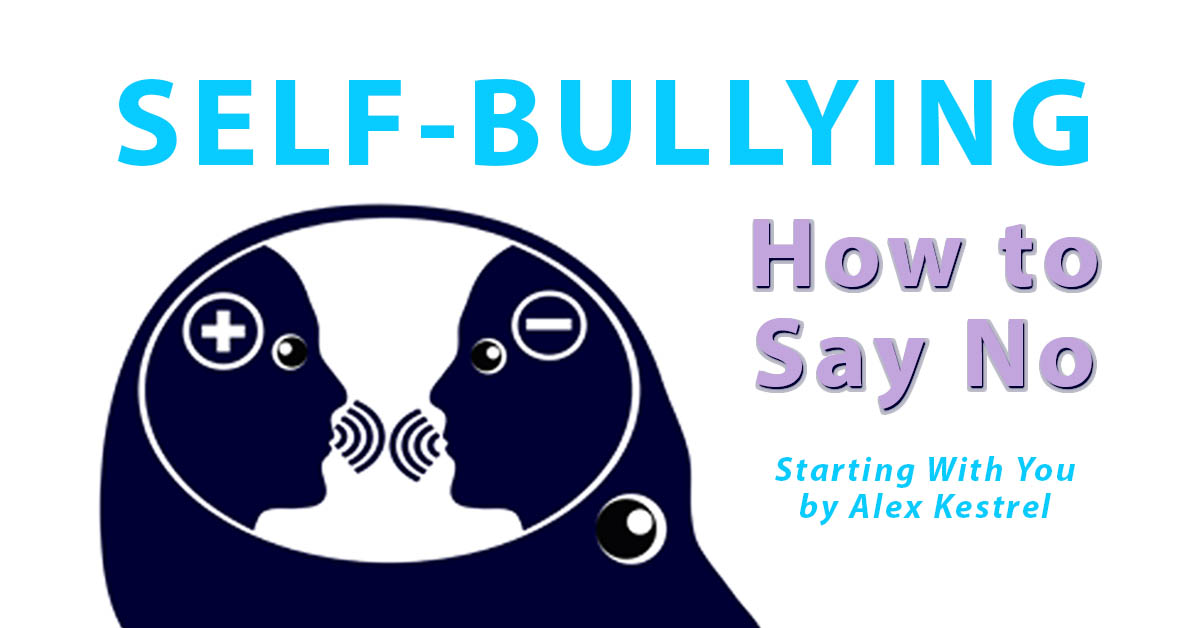Almost everyone I know seems to be plagued by constant self-bullying — that voice in the back of our heads, present most of the time, telling us “You’re not good enough” or “She doesn’t really love you” or “You’re not smart” or “You’re going to get fired” or “They’re going to realize you don’t belong here.”
Et cetera, et cetera, et cetera.
For years and years, I had an almost constant inner monologue that told me I was worthless, unintelligent, and unlovable. Who knows how much this cost me? Surely, at minimum, it cost me a huge amount of emotional and mental energy.
It probably caused me to make poor choices, be manipulative or needy, or act desperately. And those things harm our relationships. I also didn’t work towards my goals because I thought I wasn’t good enough and couldn’t achieve them.
The good news is that now, I have great self-confidence and self-worth. I don’t bully myself. I affirm myself and build myself up. Making the switch from being your own bully, to being your own cheerleader, is achievable! And it can be absolutely life-changing.
Recognizing negative self-talk as self-bullying
I’m a millennial, and I’ve noticed that deeply integrated into millennial culture is a belief that self-hatred is normal and unchangeable. It seems like every other millennial meme is a joke about how we all hate ourselves. The self-hate is framed not as a problem that needs to be solved, but as a fact of life.
But we can’t accept constant negative self-talk as normal. We need to decide that it’s a problem to be solved. Self-bullying eats away at us and degrades us. Decreasing negative automatic thoughts, by contrast, has been shown to decrease depression symptoms.
We all need to make a commitment to change our negative automatic thoughts about ourselves. But the hardest part is committing yourself to do the work. Change is hard, and when it comes to ending self-bullying, many people can’t imagine NOT engaging in constant negative self-talk.
I suggest one good way to start is to find a reason why you want to make this change. Find something that motivates you to explore strategies that change negative self-talk into positive self-talk.
It took me a long time to find my motivating reason, which is that “I deserve to be happy” and “I deserve kindness.” I’m a transgender man; when I walked around the world pre-transition, treated as a woman, I learned to hate myself. That’s what society taught me. As a person with a queer gender identity, the same happened. So I found it motivating to tell myself, “The powers that be want me to hate myself; out of spite, I’m going to learn to love and accept myself.”
The motivating factor is going to be different for everyone. Maybe you want to be a good role model for someone in your life. Maybe it’s because having good self-worth leads to a better social life and stronger relationships. Maybe you’re determined to end a generational trend of self-hatred and self-destruction.
That’s the first step: find your motivation for making this change. The second step is to try out strategies to turn negative self-talk into positive self-talk — and to keep trying them until you find what works.
Concepts of Cognitive Behavioral Therapy as a strategy
We can’t really just decide to stop thinking about something. So how do you get yourself to stop thinking something? Cognitive behavioral therapy (CBT) teaches about thought replacement strategies, in three steps:

- Mindfulness: We need to notice our own thoughts. We have to recognize and label negative self-talk for what it is: self-bullying. Try just spending a day or two noticing. Maybe keep count of the number of times you engage in negative self-talk.
- Reframing: Choose something more neutral, or even positive, to say to yourself instead. When you think to yourself, “I’m worthless,” reframe it inside to, “I’m worthy.” Instead of thinking, “She hates me,” choose “If she has a problem with me, she’ll let me know.” Instead of saying to yourself, “I’m ugly,” go with “I have great calves.”
- Intention: State the reframed thought inside, to yourself. Or even say it out loud. It’s that simple.
Putting it all together, the process is: catch your internal monologue saying something negative; pause and reframe; then purposefully state the reframed thought.
An overall tip: Just thinking to yourself, “I don’t want to think like that any more” doesn’t work for most people. To rewire our brains, we have to replace the thoughts we don’t want with the thoughts we do want. State the reframed version to yourself with as much confidence as you can muster!
This process involves changing our beliefs. We are helping ourselves to believe “I’m worthy” instead of “I’m worthless.” It leads us to check in with our values: do you believe people are worthless? Probably not. Learn to see the inherent value in yourself, the same way you see the inherent value in others.
Another tip: decide that you won’t say anything to yourself that you would not say to (insert any person here). This worked for me many years ago, when I resolved that I wouldn’t say anything to myself that I wouldn’t say out loud to my little sister. What if my sister came to me and said, “Kes (my nickname), I got a bad grade on an exam.” What would I say back to her? Would I say “You’re stupid!”? Not in a million years. I’d say, “Nobody’s perfect; stuff like this happens. What can be done to help you get a better grade on the next exam?”
That’s how I speak to myself, too.
Automatic thoughts are changeable. If we put in the work, the self-investment, we can change our automatic thoughts. We won’t have to work hard at it forever; our brains will start changing, and eventually, the reframed thoughts become the automatic ones.
You don’t deserve to be bullied. No one deserves to be bullied. You deserve kindness. And that includes kindness in how you treat yourself.







